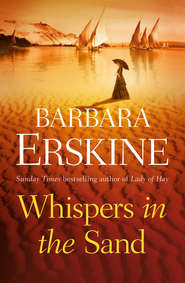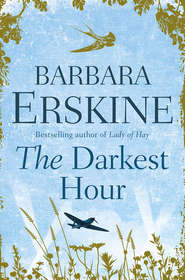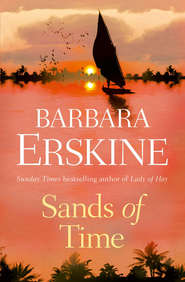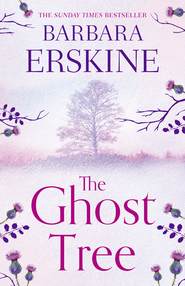По всем вопросам обращайтесь на: info@litportal.ru
(©) 2003-2024.
✖
Hiding From the Light
Настройки чтения
Размер шрифта
Высота строк
Поля
This early, the road was deserted. He strode down it purposefully, passing between houses much like his own, except that where it descended into the centre of the town they were terraced and what gardens they had were hidden by high walls. Down on the corner where Church Street met the High Street the last two houses had been converted into double-fronted shops, but a glance at the roofs showed that they too were as old as the rest of the street. One of them, he had noticed, had been empty since he moved in.
In the High Street he turned east, round the corner and down to the River Stour to walk along the road which bordered the narrow strip of salt marsh and the mudflats which were such a characteristic of the river at this point. He passed a solitary dog walker who acknowledged him with a raised hand and continued on his way. He loved this walk. Strolling along under the sycamores which lined the road to Mistley, the second half of his parish, he followed the pavement which on his right ran parallel to the long wall which once had bounded the great Rigby estates, a feature which had given the road its name, ‘The Walls’, whilst on his left lay breathtaking views of water, mud and sky. He stopped and stared for several minutes. The tide was out, the river estuary mostly mud, the low Suffolk coast on the far side hidden in the early morning mist. The shore was blue and mauve with sea lavender and tiny yellow-centred asters and as he walked slowly on he became aware of multitudes of birds running about on the mud. He wasn’t very good at bird identification but he could recognise a seagull when he saw one, and swans, and what he thought might be oystercatchers, with their smart black-and-white plumage and red bills.
He was heading for the second of the churches in his sprawling parish of Manningtree with Mistley, the one which, he admitted wryly to himself, fascinated him probably far more than it warranted. When he had first arrived he had asked to be shown it several times. He knew of course that it was a ruin, but surely, he had thought, there would be something to see. He knew he was a bit of a romantic, a side of himself he tried sternly to keep under control, but he did feel, quite strongly, that even a ruined church would still have an aura of sanctity about it. Perhaps he would be able to hold the occasional service in the ruins. He had not at the time had the chance to put this idea to anyone locally and perhaps that was just as well. His first few requests to see it had somehow not been heard. And this lack of response had intrigued him. He had investigated its history and found amongst other things that it might have been the burial place of the notorious Witchfinder General. He had of course gone looking for it himself at the first opportunity. What he found had disappointed him, but he had driven past on a rainy day. Today he was on foot and it was a glorious morning and he wanted to see if he could find out why the church had been allowed to fall into decay. Why it had been demolished.
Cutting through the centre of Mistley with its irresistible combination of Victorian industrial buildings, old Maltings and quay, its famous Adam Towers and swan fountain, its lovely houses and cottages, he made his way inland up a short track towards the path across the fields. He loved Mistley. The centre of the village was very small and these days so quiet it was hard to picture it as the bustling town it had once been.
The ruins of the old church lay up a narrow road beyond New Mistley, opposite the lane up which he strolled. Beyond, across the shoulder of the hill, he could see glimpses of the broad estuary, the water brilliant blue beneath the clear sky. There was a wind out there. He could see a white sail tacking out towards the sea, but inland it was very still, and the air was growing hotter. He could smell the wild honeysuckle in the hawthorn hedges, and the hot floury scent of the stubble in the fields.
He paused, looking round. There was still no one about. It was extraordinarily quiet. Turning slowly he found himself wishing suddenly that he had a dog to walk. It would be company on his early-morning strolls. In the distance he could see the huddled roofs of the small hamlet of Old Mistley, while behind him sprawled the houses of the new developments. But here, in the fields he was completely alone.
The site of the church was unmarked. All he could see was the brick wall which had surrounded the churchyard. It was almost buried under brambles and nettles now and behind it was what looked like a small orchard or paddock. There was no sign of the church itself at all. Within living memory, so he understood, the tower had still been standing and had been used to conduct funerals, then it had been declared unsafe and demolished. The site had been sold.
On the opposite side of the road was a pink-washed cottage, set back behind a wild tangled hedge. Its windows were dark and bare of curtains. A drunken-looking For Sale sign lounged beside the gate.
‘Can I help you?’
A stocky, bearded man had appeared in the lane behind him, two black labradors waiting patiently at his heels. The man’s eyes were hard with suspicion.
Mike shook his head. ‘I was just looking. I wondered if anything remained of the old church.’
‘It’s long gone.’ The man’s expression did not invite confidences and Mike found himself biting back his intention of introducing himself.
‘A shame,’ he said mildly.
‘Damn good thing. Evil place! You keep out of there. It’s private property.’ Whistling to his dogs, the man walked on up the road.
Mike exhaled loudly. Evil? No, how can it be, it’s church property, he wanted to shout. Mine! But of course it wasn’t true. Not any more. He watched the retreating back for a minute or two, then resumed his inspection of the site. As far as he could see there were no yew trees, no grave stones, no sign at all that there had ever been a church there except for the wall, and, he squinted through the nettles, the twisted remains of a gate lying below what had once been a gatepost deep in the undergrowth.
The wall beyond it, round the corner, had begun to crumble away. Without giving himself time to think Mike pushed his way through the nettles and scrambled over the broken bricks into what had once been the churchyard itself. Branches swung across behind him and within seconds he was totally screened from the road. He smiled to himself. It probably wasn’t wise for the rector to be caught trespassing but on the other hand his curiosity had been intensified by the man’s aggressive manner.
He moved forward into a patch of sunlight and stared round. He could see signs of old walls now, and a faint rectangular depression in the ground where the church must have stood. The whole area was thickly wooded. As far as he remembered from its description in The Lost Parish Churches of Essex it had been a beautiful medieval church with nave, aisle, porch and tower. The village had moved, the population drifting down the hill towards the bustle of the small port on the river’s edge, but that did not explain why it had been so completely lost. After all, there were other remote churches around; churches in the centre of a field or a wood and they had not been pulled down. They had been treasured and preserved. The voice of the man in the lane echoed suddenly in his head. ‘Evil place!’ he had said. Why evil? Was it something to do with Matthew Hopkins and the witches, or was it something else? Something infinitely older? An ancient ash tree shaded the ground and everywhere there were hawthorns and elders, heavy with ripening berries. The grass was kept short, he saw now, by some half-dozen sheep which were grazing on the far side of the trees. It was a beautiful, peaceful place. He took a couple of steps forward and paused. The birds had fallen silent. He shivered as a shadow fell across the ground at his feet.
Why exactly had they demolished the church? And if it was because it had grown dangerous, why had they allowed that to happen? And why had they to all intents and purposes flattened the graveyard? Not a single stone survived upright as far as he could see. And why, on this once-hallowed ground, was there not even one single cross as a memorial to the building that had once stood here?
Slowly he turned. The sun had disappeared behind a single stormy cloud and the warmth of colour had gone out of the morning. Making his way towards the gate he found himself conscious suddenly that someone was watching him. The skin on the back of his neck prickled and he glanced round again. He could see no one.
‘Hello?’ His voice sounded curiously flat in the silence. ‘Is there someone there?’
There was no answer.
By the distant wall the leaves rustled briefly and he swung round. ‘Hello?’ he called again. The wall was in shadow now, the bricks uneven, covered in moss and ivy. Something moved suddenly and he focused on it carefully. A tiny, mouse-like brown bird was running in and out amongst the ivy. A wren. He watched it for a minute and found he was smiling, his sudden tension defused.
Making his way back to where the gate had been he stared down at the gap in the wall. It had been filled with barbed wire. A rusty chain which had once held the gate closed dangled emptily in space. He fingered it slowly, then climbed back over the wall. Clearly he wasn’t the first to do so. He could see the signs now of other feet on the crumbling mortar, bent and broken vegetation, an old footprint set into the mud, long dried and baked in the August sun.
Once in the lane, he turned away from the church and began to walk briskly back towards Mistley. Next time he came up here he would drive up the hill, wear his dog collar and make a few calls. Whilst attending to his parochial duties he could ask a few questions about the church that was no more. He did not even glance at the cottage across the road.
5 (#ulink_5153d059-b418-5439-96ca-e302544d54d6)
Lyndsey Clark had lived in Mistley for five out of her twenty-five years. She knew every inch of this place – the church ruins, the churchyard, Liza’s – and regarded them all as her own. She had recognised the rector as soon as he had emerged from the path across the field and she watched curiously to see what he was up to, catching her breath suspiciously as he climbed into the churchyard, creeping forward in the shelter of the hawthorns to see what he was going to do. He shouldn’t be here. She shivered violently. He was disturbing the place, she could sense it already, although – she frowned, her head cocked like a dog picking up a scent – not intentionally. He didn’t know what he was doing. She shook her head in an anguish of worry suddenly, pushing her short dark hair back off her face.
Leave. Please leave. Quickly. Before you do damage.
Biting her lip, she craned between two branches, her vivid blue eyes focused intently on the figure under the trees.
He was feeling his way. After a while he turned back towards the road, then he stopped and looked straight at her even though she knew he couldn’t see her. She was wearing a dark green T-shirt and black jeans which must have blended into the shadows, and yet – she held her breath. Yes, he was a sensitive. That would be dangerous in a man of the church, although in her admittedly somewhat limited experience, those were rare these days.
She heard the wren in the ivy near her, saw him spot the bird and watch it for a moment, smiling to himself, then he was on his way over the wall and out into the lane. He did not even glance in her direction.
Silently she whispered a thank you to the little bird which had taken his attention. It paused, cocked its head in her direction, bobbed a quick acknowledgement and it was gone.
She gave him a minute or two to get well down the lane, then she made her way to the crumbling part of the wall where it was easy to climb in. The atmosphere, usually, thanks largely to her efforts, so placid and dreamlike, was uncomfortable, the air tense and jumpy. She made her way slowly towards a rough patch of grass where lichen and moss had grown over the foundations of the long-fallen wall. It was near here she felt Hopkins most strongly, the man whose evil haunted her life. It wasn’t the grave, of course, but too many people had thought it was even after the church was finally demolished, the graveyard destroyed, the land deconsecrated. Especially after it was deconsecrated. Their thoughts, their fears, their excitement and their malice had congealed into a tangible weight of sorrow and fear. Most of the time she could contain it. She knew the ways. Counter spell and spell. Prayer. Binding charms. They all worked if one knew what one was doing; all prevented the reality manifesting from the thought. As long as nothing – no one – upset the balance.
Glancing round to make doubly sure no one was there, she fished in the pocket of her jeans for a small pouch. In it were dried herbs. Herbs gathered from the garden at Liza’s. Carefully she scattered the dusty leaves around the inside of the walls before going back to the centre, where she crouched down on the ground and scraped a small hole amongst the grasses with her fingernail. She tucked the pins and the small piece of knotted thread into the soil and covered them, rearranging the grass around the place. In seconds all signs of her intervention had gone. Standing up again she wandered over to a tree stump where for a moment she sat down, the sun on her back. She could hear the bees humming in the flowers nearby. They were calm now, their agitation soothed. If she listened she could hear their gossip, the hive memory, relayed down the years …
The garden had been smaller in Cromwell’s time, enclosed within a picket fence, the small neat beds in summer a riot of undisciplined bounty. Fruit and flowers, herbs and vegetables, all crammed into the spaces between the gravel paths where yet more herbs had seeded in a riot of colour. Marigold and feverfew, dandelion and hyssop, thyme and marjoram. Liza made her way slowly between the rosemary bushes, her basket in her hand, plucking a sprig here, a leaf there as the sun dried the dew and the plant oils began to release their scents into the morning air. She woke at dawn on these summer mornings, glad to lever her aching bones from her bed. As her body bent and grew frail the pain became more intense. It was hard to look up now, the curve of her back was so pronounced. Hard to look at the sky, to see the sun, to watch the birds fly over. Her knowledge and experience of remedies and medicines was of little use to her now. Nothing she did seemed to help. Only the sunshine, with its blessed warmth shining down on her eased her a little. She crooned a greeting to the old cat sitting on the path ahead of her and it rose, coming to rub against her legs, before sitting once more in the patch of sunlight and lifting a fastidious paw to wash its left ear.
She needed horehound and pennyroyal and thyme for young Jane Butcher who was near her time. It would be a long and painful birth if she was any judge. The child in her belly was huge – the babe taking after its father, John Butcher, a large man whose two earlier wives had both died in child bed. Why didn’t he choose a woman with broad hips and meaty thighs like his own? Why did he pick such little child-wives with such narrow bones? She shook her head sadly. Jane was terribly afraid. And with reason. Liza passed on amongst her plants. She needed hyssop and blackberry leaves for her neighbour’s sore throat and a poultice for Sir Harbottle Grimstone’s cowman who had a cut on his hand which was swollen and yellow with undischarged pus. She sighed. They paid well, her customers, and she was happy to help them with their pain, but sometimes she wished there was someone who would help her. Someone to bring her warm soothing possets in the evening, someone to help her change her old woollen gown when the ache in her arms made her cry as she tried to pull it over her head, someone who would take over the garden for her before it ran riot for the last time and took her by the throat and strangled her. She gave a hoarse chuckle at the thought. As long as the plants survived she supposed it was all right. They didn’t need to be as neat as they were when she had first planted out her little medicinal garden. And they would probably outlive her. And Sarah came when she could with a basket of food or a warm shawl or a jug of ale. Sarah, daughter of the manor, her suckling child, the little girl who had replaced her own dead baby at her breast. She pulled her small shears out of her pocket and snipped and cut and tugged at the leaves until the basket was overflowing.
The cat had followed her. It stopped near a patch of catnip and threw itself headfirst into the clump, rolling ecstatically amongst the aromatic leaves and she chuckled again.
On a shelf in the cottage she kept the utensils of her trade meticulously neat. Pestle and mortar, bowls, scoops and jugs, all washed and drained and clean. Baskets and bags of dried herbs hung on hooks from the ceiling beams and boxes were stacked carefully on a table in the corner. She set her basket of fresh pickings down on the table and went to check the fire. The iron pot of water hanging over the coals was nearly boiling.
Jane Butcher’s medicine first.
She worked on for a long time, conscious that the beam of sunlight coming through the kitchen door was moving steadily across the floor. Soon the sun would move round into the south and her kitchen would be shadowy again and cool. Squinting at the jug in her hand she tried to work faster. Once the sun had gone it was harder to see what she was doing and more and more often the thick black tinctures which came from her pots would spill across the scrubbed oak of her table.
Once she stopped and stared at the door, listening. Had that been someone at the gate? She could hear the high-pitched alarm call of a mother bird telling her young to hide low in the nest – a cry understood and acted on by every other bird in the garden. Perhaps it was the old cat which was causing such consternation. His roll in the catnip might have rejuvenated him enough to stalk a bird but somehow she doubted it. She frowned. Her hearing was still acute even if her eyes were growing dim. In the silence of the garden she could hear menace. Slowly putting down her jug and spoon she hobbled to the door and stood looking out. There was no one to be seen. The lane was empty. There was no sign of the cat. But somewhere something was wrong.
Then she saw him, the man standing half hidden in the shade of the old pear tree in the hedge and she recognised him. It was one of Hopkins’s servants. She stared at him for a moment, puzzled. Why was he watching her? Seeing her turn towards him he drew back into the shadows and she saw him clench his fists into the sign against the evil eye before he turned and fled, and in spite of the warmth of the sun across her shoulders and the scents of the herbs around her she suddenly smelled the cold breath of fear.
6 (#ulink_3fa685d4-4166-5b45-bb03-9d2b19c69bdf)
Pulling her MG into the car park near the Co-op Emma crawled slowly between tightly packed rows of cars trying to find a space. ‘Better to park there and walk up to the shop,’ the house agent had said. ‘There’s no parking along the High Street here and not much anywhere on a Saturday.’
How right he was. The place was teeming. Someone backed out in front of her and she turned into the space with relief. She was exhausted. It had been a two-hour drive from London – a drive starting with a row with Piers …
‘I’m sorry. I told you yesterday, I am not going off on some wild goose chase to see a cottage I don’t want in a county I don’t like on a weekend I want to stay at home!’
He had been furious when she confessed she had rung the agent that morning at nine a.m.
‘Yes, you’re right. It is Liza’s.’ The young man’s voice had been hoarse, as though he had a bad cold. ‘Yes, it is still on the market. There’s been a lot of interest, but no one has made a definite offer yet. Yes, you could view it today.’
‘Liza’s.’ She had repeated the name to herself as she hung up. ‘Liza’s Cottage.’
Will Fortingale, the young man at the estate agent’s, did indeed have a bad cold. His nose was red and swollen and he was clutching a large handkerchief as he opened the filing cabinet and pulled out a folder of particulars and a bunch of keys.
‘Do you know how to find it?’ He withdrew a couple of stapled sheets of A4 and handed them to her.











